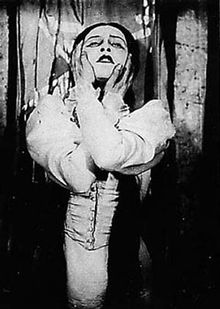Hanna Rovina
Hanna Rovina | |
|---|---|
 Hana Rovina in The Dybbuk (1920) | |
| Born | 15 September 1888 |
| Died | February 3, 1980 (aged 91) |
| Citizenship | Israeli |
| Occupation | Actress |
| Spouse | Moshe Halevy |
| Partner | Alexander Penn |
| Children | Ilana Rovina |

Hanna Rovina (Hebrew: חנה רובינא; 15 September 1888[1] – 3 February 1980), also Robina, was an Israeli actress. She is often referred to as the "First Lady of Hebrew Theatre".[2]
Biography
[edit]Hana Rovina was born in Byerazino, in the Igumensky Uyezd of the Minsk Governorate of the Russian Empire (present-day Belarus),[3] to David Rubin, a timber merchant and Sarah-Rivka Rubin. She had one sister, Rahel and one brother, Zvi. She trained as a kindergarten teacher at a course for Hebrew-speaking kindergarten teachers in Warsaw (prior to the First World War).[4]
She had a daughter, Ilana, born in 1934, with the Hebrew poet Alexander Penn.[5]
Acting career
[edit]She began her acting career at the "Hebrew Stage Theatre" of Nahum Tzemach.[6] She joined Habima Theatre in 1917 just as it was being launched, and participated in its first production, a play by Yevgeny Vakhtangov. She became famous for her role as Leah'le, the young bride who is possessed by a demon in The Dybbuk by S. Ansky.[7]
In 1928, Rovina and the other actors of Habima immigrated to Mandate Palestine. Habima became the flagship of the new national theatre movement, and Rovina was recognized as the movement's leading actress.[8] The image of Rovina in her role as Leah in the Moscow performance of The Dybbuk, in a white dress, with her long black braid, became an icon of the emergent Hebrew theatre.[9][10]

Rovina took her acting very seriously and tried to live the life of the character, as prescribed by the Stanislavski School.
Nisim Aloni wrote a play, Aunt Liza, especially for her and Rovina played the lead.[11]
Rovina made high demands of her audience. She frequently stopped a play in the middle if she felt that the audience was not attentive enough. In one instance, she stopped the play Hannah Senesh in the middle of a scene and told the teenagers in the hall to stop eating sunflower seeds. [citation needed]
Awards and recognition
[edit]Rovina was awarded the Israel Prize for theatre in 1956.[9][12] She remained active on stage until her death, in 1980.[13] She died in Ra'anana, aged 91.
Gallery
[edit]-
Hanna Rovina
-
Rovina's room in Habima theatre, Tel Aviv
-
Hanna Rovina in Mirele Efros costume by Yitzhak Frenkel
See also
[edit]References
[edit]- ^ On the dispute over her birth date, see: Carmit Guy, Ha-malka nas‘a be-otobus. Rovina ve-"Ha-Bima", Tel Aviv: Am Oved, 1995, p. 16.
- ^ Losin, Yigʼal (27 August 2008). Pillar of fire: the rebirth of ... Shikmona Publishing Company. ISBN 9781870050487. Retrieved 14 September 2011.
- ^ Green, David B. "1980: A woman who thought what Moscow needed is Hebrew theater dies". Haaretz.com. Archived from the original on 2024-04-09. Retrieved 2025-01-20.
- ^ Levy, Emanuel (1979). The Habima – Israel's National Theater, 1917–1977: A Study of Cultural Nationalism. New York: Columbia University Press. ISBN 0-231-04582-4. p. 6.
- ^ Her Mother's Daughter, Haaretz
- ^ Didier, Béatrice (2013). Le dictionnaire universel des créatrices (Éditions Des femmes ed.). p. 3759. ISBN 2721006312.
- ^ Patai, Raphael (2000). Journeyman in Jerusalem: Memories ... Lexington Books. ISBN 9780739102091. Retrieved 14 September 2011.
- ^ Kohansky, Mendel (2007). "Hanna Rovina." Encyclopaedia Judaica. 2nd ed. New York: Macmillan Reference USA. Retrieved via Biography in Context database, 2017-03-07. "Arriving with the company in Palestine in 1928, she was soon acknowledged as the country's leading actress and henceforth her career was identified with Habimah."
- ^ a b Yerushalmi, Dorit (March 1, 2009). "Hanna Rovina". Jewish Women: A Comprehensive Historical Encyclopedia. Jewish Women's Archive. jwa.org. Retrieved 6 March 2017.
- ^ Bullock, Ken (July 2, 2009). "Habimah Resurrects 'The Dybbuk'"". Berkeley Daily Planet. Retrieved 2017-03-06. "Indeed, the photograph of Rovina as Leah from the Moscow production became the icon of the Habimah—and of Jewish theater generally."
- ^ Ben-Zvi, Linda (26 February 2008). Theater in Israel. University of Michigan Press. ISBN 9780472106073. Retrieved 14 September 2011.
- ^ "Israel Prize Official Site - Recipients in 1956 (in Hebrew)".
- ^ Comay, Joan; Cohn-Sherbok, Lavinia (2002). Who's who in Jewish history: after ... Psychology Press. ISBN 9780415260305. Retrieved 14 September 2011.
- 1888 births
- 1980 deaths
- People from Byerazino
- People from Igumensky Uyezd
- Belarusian Jews
- Soviet Jews
- Soviet emigrants to Mandatory Palestine
- Jews from Mandatory Palestine
- Israeli people of Belarusian-Jewish descent
- Israeli stage actresses
- Jewish Israeli actresses
- Israel Prize in theatre recipients
- Israel Prize women recipients
- Burials at Kiryat Shaul Cemetery
- Belarusian people of Israeli descent
- Soviet people of Israeli descent



